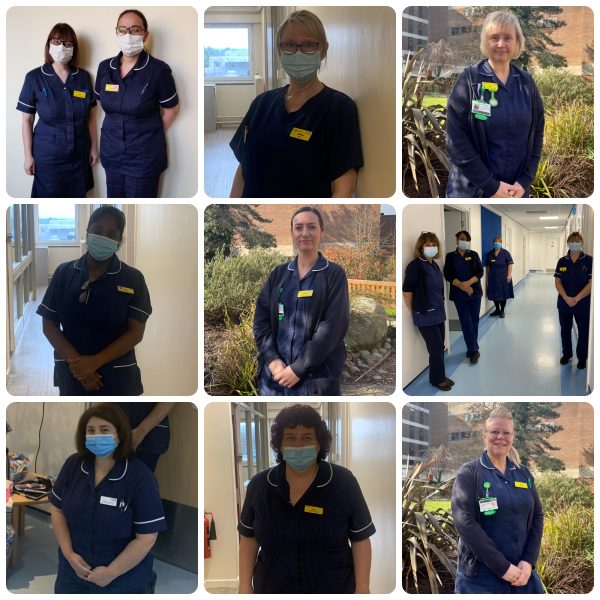Monthly archives: March 2022
ICS equality, diversity and inclusion (EDI) strategy engagement questionnaire
To help the ICS develop a strategy it’s important they hear and understand the views and experiences of SWB colleagues which is why they have put together a questionnaire that has been designed to capture your views on a range of topics including: who you are and the organisation you work for, how your organisation supports and cares for you and your colleagues, your organisation’s response to COVID-19 and the pandemic and finally some questions about your demographic characteristics.
If you would like to share your views and complete this questionnaire, please click here.
Focus groups are also being held on the below dates on Wednesday throughout March.
- 16 March, 10am – 11am
- 23 March, 1pm – 2pm
To find out more and register for a place at one of these focus groups please use the online form.
For further details please email mlcsu.involvement@nhs.net
GMC number needed when completing verification of death
Colleagues are reminded to please ensure that when completing a verification of death, you include a GMC number on Unity.
Cremation forms are being rejected by crematoriums/medical referees because there is no GMC number included on the form and subsequently causing delays in the process for bereaved families in making funeral arrangements for their loved ones.
Recognition boost for Cancer Clinical Nurse Specialists: 15 March
Today (Tuesday 15 March) we will be celebrating the first ever National Cancer Clinical Nurse Specialist (CNS) Day.
At our Trust we have 34 Cancer CNSs who provide vital support to patients, helping to improve their journey following diagnosis.
Patient Jane Evitts has shared her powerful story about how the CNS team has been there for her, beginning from the moment she was told she had cancer in April last year.
In the video below, she tells how the team have been an extremely important part of her life over the past year, ensuring she has had the right support and care throughout.
We want to thank all our cancer CNSs – they do an incredible job caring for patients at such a difficult time in their lives.
Sad passing of Colleen Marsh
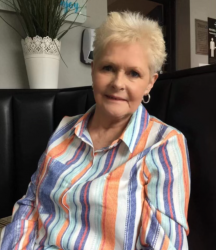
It is with great sadness that one of our much loved colleagues Colleen Marsh, who worked for many years in the antenatal clinic has passed away.
Colleen joined the Trust in November 1988 and began in medical records before transferring to antenatal in 1990 where she worked for over 30 years at Sandwell and more recently at City, having retired just last year.
Colleen made many friends along the way and will be fondly remembered by all who knew her.
Heartbeat: Identifying patients with a short prognosis
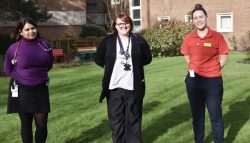
At SWB we use the end-of-life dashboard, a platform for collating information, stats and feedback relevant to the end-of-life care delivered on a particular ward.
We caught up with Dr Hannah Mottershead, Elderly Care Consultant who told us more about how the dashboard is used to plan the care of some of our patients.
She said: “The dashboard is very useful for looking at whether your ward is meeting end-of-life quality care indicators, establishing whether performance is improving over time and for easily identifying which aspects of end-of-life care require more attention than others.
“As a summary you can also look at the data and ask yourself – does this match my perceptions as to how we are doing? If it doesn’t, this is a great triggering question for asking yourself why. Perhaps our documentation isn’t truly matching our actions, perhaps we aren’t recognising early enough that people are in the last phase of their life? How can we improve these things? Also, you can look to see how different areas are working – maybe a different ward has some great lessons that they could help us with so that we can improve too.”
Hannah went on to explain the challenges of having end of life discussions with patients and families.
“These conversations are challenging, no one will ever argue with that, but that doesn’t mean we should be put off from having them. If a patient chooses not to discuss it then that is their choice and should be respected, but that is different from not being given the opportunity to talk about it.
“The frail elderly patients I see are rarely shocked that I think they might be dying – they think that themselves and are often relieved that they get to talk about it and tell us what they want. Mostly I feel that I am able to provide reassurance that help is available rather than worsening fear. Not talking about the inevitable (and often clinically obvious) development of events towards the end of life, can increase a patient’s fear.
“End-of-life care can be physically and emotionally draining and some colleagues have a natural ability to have more difficult conversations and to recognise that a patient is end-of-life. They have had clinical, and probably personal, experiences that have equipped them with the expertise they need to deal with caring for the dying in an empathetic and holistic way.
“I believe that our staff want to provide patients with the best end-of-life possible, even when they are struggling to do so. Skills can be improved with training, cycles of quality improvement projects, continued campaigns to increase awareness, championing the topic and rolemodelling quality care. The end-of-life quality improvement project is looking at all of these issues realistically, that’s what is going to make it a success.”
Hannah also shared her top tips.
“I would suggest being open minded to the possibility that patients are within the last year of their life. Ask yourself the question, use the SPICT tool, which is now embedded within Unity, and ask for help. Don’t be afraid to gather the opinions of your juniors, your nurses and your wider MDT. Maybe they have seen something that you have not. Look at the dashboard, get training.
“I could go on about top tips for years. Better than all of this, if you are not recognising that people are dying, if you don’t feel comfortable having these conversations, if you find yourself questioned on end-of-life care regularly, please don’t get frustrated and downhearted, but please do take the time to question why. There is training and help available.”
Women’s and child health launch Midland Met newsletter

As part of our preparations to move to Midland Met, we hold regular communications and engagement group meetings.
Sessions are attended by clinical and operational leads. The focus is to ensure that colleagues access clear information about the programme. It is crucial that colleagues understand the changes happening and how this impacts individual areas and services.
One of the ways Groups are looking at communicating local news is via their own newsletters. Recently, women’s and child health launched their first newsletter to keep colleagues up to date with all the latest news and views from their area.
Isobel Dayus, Project Support Officer, told us: “In my role, I help to keep our Group up to date with the latest developments around the Midland Met project. I have taken the lead on developing our newsletter, and I will be collating regular updates from across the service to ensure everyone stays up to date with what’s going on locally.”
To check out the women’s and child health newsletter click here.
For more information on Midland Met check out our dedicated Connect pages.
Heartbeat: District nurses adapt safety huddles for the community setting
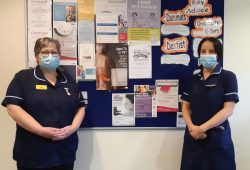
While safety huddles are primarily implemented in inpatient areas at many healthcare providers, at SWB we are in the process of rolling out safety huddles throughout the whole patient journey, to provide safety at an enhanced level to all our patients.
The seven district nurse teams started implementing daily safety huddles in the summer of 2021. The concept of multidisciplinary team meetings held at a predictable time was a bit of a challenge for the teams who had to navigate through a safety huddles redesign journey, to ensure the safety huddles are fit for purpose in the community.
Helen Benwell, Team Leader (blue team based at Smethwick), explained: “Logistics was our very first hurdle. We operate from 8am to 8pm, with a team of up to 12 members carrying out home visits across the community. After trialling different times of the day, we all agreed that it is best to attach the safety huddle to the daily handover at 1pm, via Teams.”
Emily Hobbs, Clinical Lead added: “There is a real momentum for the safety huddles, our teams have adapted to it very well and use the opportunity to discuss general safety issues effectively which complements the handover very well.”
District nurse yellow team based at Yew Tree host their safety huddles face to face at 2pm also as part of the daily handover. Team Leader, Zeena Tudor told us it has been quite a journey for the teams to finalise the daily general safety focuses. She said: “It is always our daily routine to highlight any patient safety concerns therefore, we are trying to use safety huddles to streamline and discuss concerns and issues collectively which provides a ‘debrief’ function, helps improve the flow of the day significantly.”
Lone working, family home environment, ongoing safeguarding and senior reviews are also part of the daily safety huddles to ensure staff safety. Trish Collins, Clinical Lead from yellow team further added: “The safety huddle is also a great platform to ‘prompt’ each other, for example, are you regularly doing your LAMP tests?”
Trish, Emily, Zeena and Helen all find safety huddles to be an open and transparent forum to discuss issues that each team member might have and to provide support to each other in a timely manner which, is incredibly important as team members are primarily lone working.
“The pandemic has increased the complexity of some of our home visits,” said Andrew Churm, District Nurse Matron. “Safety huddles have been a great supportive mechanism to provide additional support to all our team members, especially to our new members.
“It has been great to see our team leaders implement the safety huddles into their daily handovers. By doing this they have been able to collect vital data and identify themes that can be taken into their monthly Band 7 forum. This acts as a springboard which accelerates the development and implementation of quality and safety initiatives that will have a direct impact and benefit for the people that we serve.”
The district nurse teams are currently working with the performance and insight team on the development of their safety indicators which will be available on the safety huddles dashboard on Connect shortly. They are already discussing how to utilise the data available on this easy-access dashboard to further improve on the right care, right time, right place to their service users.
Extension of temporary easements for retire and return to 31 October 2022
The agreed extension will take effect from Friday 25 March to ensure the continued easements of NHS pension scheme regulations following the expiry of temporary easements on Thursday 24 March. The ‘retire and return’ easements will now continue until 31 October 2022.
The amendments to the NHS pension scheme regulations will continue the temporary easements of:
- The 16-hour rule in the 1995 section
- Abatement of special class status members who retire and return to work between age 55-60 in the 1995 section
- Abatement of draw-down members who claim a portion of their benefits and continue working in the 2008 section and 2015 scheme
These easements allow retired and partially retired colleagues to return to work in the NHS or increase their working commitments without having their pension benefits suspended or reduced.
For more information on the current easing of retire and return restrictions on pensions please see COVID-19 guidance on support for retired members page on the NHS Pensions Pensioner hub.
Chief Executive’s Message – Friday 11 March
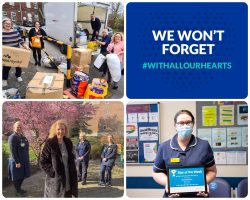
Another week with heartbreaking stories continuing to come out of the situation in Ukraine. We are all deeply troubled by the news that is reaching us. Thank you to everyone who has donated directly to the Disasters Emergency Committee who are channelling resources towards those fleeing from conflict. Lots of you are also supporting other local and national responses and are being extremely generous. Jenny Donovan and her cancer services team have coordinated supplies from staff donations to a local organisation in Smethwick who are transporting clothing, toiletries and other items to border towns. For those staff with family in Ukraine and everyone affected by this crisis please know that there is support available from our own occupational health service and the Black Country hub with their counselling and support offer. The news can cause extreme anxiety, which is normal, and will be even more concerning for staff who have family or loved ones who are affected. We will support you. Don’t be afraid to ask for help.
Closer to home, the escalations in cost of living, plus the additional impact of the war in Ukraine, is being felt by all of us, but particularly those of you on lower incomes. We know this will remain challenging for some considerable time and whilst we can’t magic up pay rises for all our staff because of the reduction in income coming to organisations in 2022/23, there are things that we can and will do to help ease that burden including the everyday discounts we can offer you through SWBH Benefits. Let us know what you think would help while we review the support that is already available to all staff.
There is, however, lots of good news in our organisation where acts of kindness are recognised and appreciated. Our star of the week this week is Claire Obiakor from Acute Medicine. Claire was nominated for the support she has given to a colleague in helping her back to work after a period of ill health. Claire has been praised for the way she has managed the unit during the pandemic and for the support given to all the team. Thank you, Claire.
On Tuesday next week the first ever National Cancer Clinical Nurse Specialist (CNS) Day takes place. At our Trust we have 34 Cancer CNSs who provide vital support to patients, helping to improve their journey following diagnosis. Patient Jane Evitts has shared her experience with the CNS team and will share her story in a filmed message on Tuesday. The Cancer CNSs embody everything that is great about our Trust. On that theme, our Trust Board has this week been thinking about what makes our organisation great and what could be better as we continue on the journey to firm up a new set of values, a new way of working together, which will underpin our new strategy and the “3 P’s”. The Cancer CNS team are an excellent example of the values and behaviours that all in our Trust should live up to. If you haven’t yet, please take just two minutes to answer three quick questions to help shape our values. In different times we would perhaps be doing lots more face-to-face events and activities to help people to have their say. COVID-19 and the overwhelming workload we face is preventing some of this, so this great opportunity is here now for you to take part in.
We today marked two years since the pandemic with a national remembrance event taking place in Staffordshire, arranged by NHS Charities Together. Our very own Wanika Simpson, HCA from AMU, was representing our Trust and remembering all those health care workers who we have sadly lost since 2020. It is sobering to consider how much has taken place and changed in the past two years. This weekend marks this Trust’s first inpatient who died with COVID-19. I hope you have an opportunity to reflect, with sadness, gratitude, but also with pride on just how much this Trust, you personally and your teams have contributed to our shared response to care for all patients and those within our populations.
#WithAllOurHearts: A minute’s silence
NHS Charities Together are asking everyone to observe a nationwide minute’s silence at 11am this coming Friday, 11 March. Which is the second anniversary of when the World Health Organization (WHO) declared COVID-19 a pandemic.
This will be a part of a remembrance event, livestreamed via both YouTube and Facebook from 10:45am. The event held at the National Memorial Arboretum in Staffordshire, will host NHS staff representing all nations of the UK and all areas of healthcare will be in attendance – including ambulance, hospital, mental health, community, social care and primary care services. Wanika Simpson, Acute Medicine Health Care Assistant will be in attendance representing SWB.
The event will feature personal readings and testimonies and NHS colleagues will be joined by patient representatives to lay blue heart wreaths as a symbol of gratitude and remembrance.
Colleagues at the Trust can congregate outside the main entrances to observe the minute’s silence if they wish to and are able to do so. However, please continue to observe our social distancing guidelines.
← Older items Newer items →
